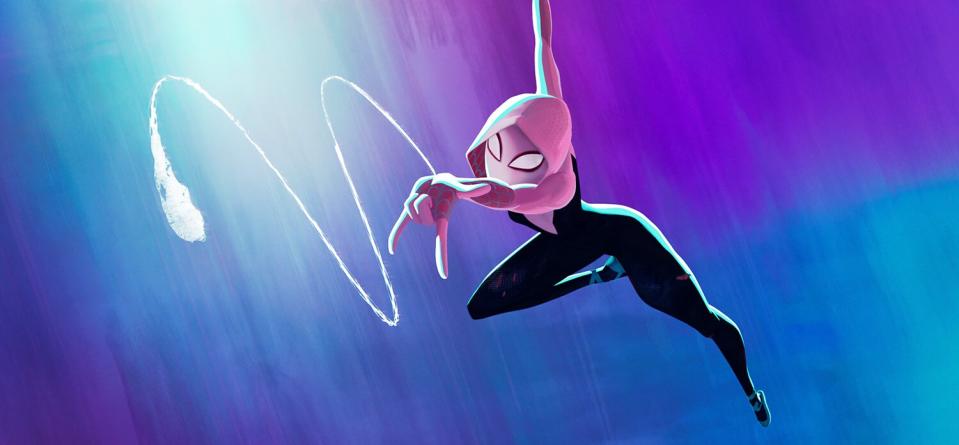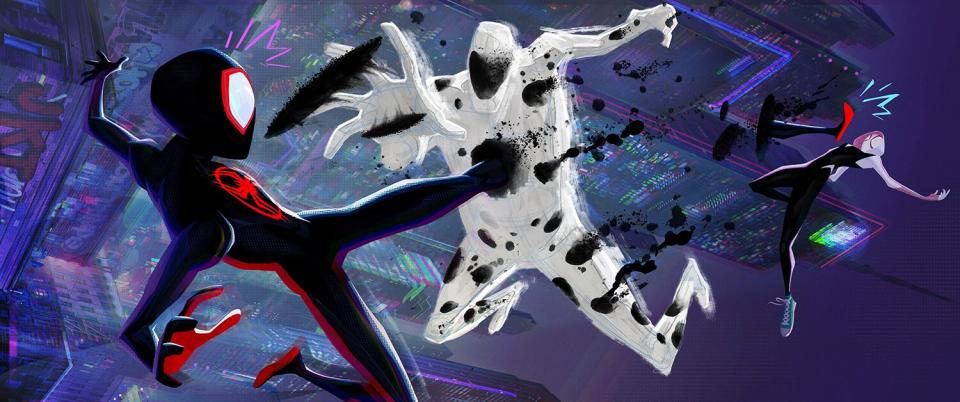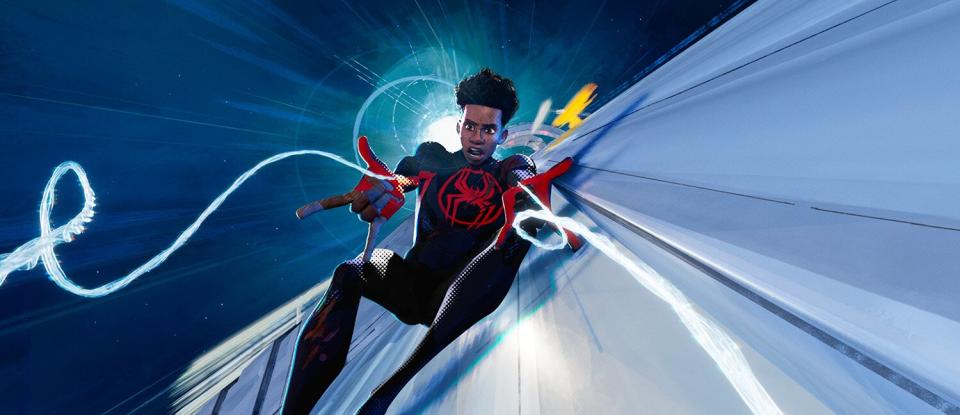Across the Spider-Verse review: Spider-Man sequel is even more colorful and creative, if incomplete
Spider-Man: Into the Spider-Verse might be the best superhero movie of the past five years, and even if not, it is absolutely the single most influential superhero movie of recent times. That influence extends across both live-action (with the Marvel Cinematic Universe fully aping the movie's multiversal magic in Spider-Man: No Way Home) and animation (where its energetic mash-up of different visual styles and eye-popping colors have been embraced by other recent cartoon standouts like Puss in Boots: The Last Wish and The Mitchells vs. The Machines). Needless to say, the bar for the long-awaited Spider-Verse sequel has thus been raised very high.
Now that it's finally here after pandemic delays, Spider-Man: Across the Spider-Verse totally exceeds expectations when it comes to visual aesthetic and character development. Where the first movie was a coming-of-age story about how fun it is to become Spider-Man, this movie is about how hard it is to actually be Spider-Man — day in and day out, making all kinds of sacrifices to live up to the awesome responsibility of the mantle.
That's not the only thing different about the storytelling this time around, either. While Miles Morales (Shameik Moore) is still a major focus, the central POV of Across the Spider-Verse actually shifts over to his friend from another dimension, Gwen Stacy, a.k.a. Spider-Woman (Hailee Steinfeld). It's a refreshing change!

Sony Pictures Animation Gwen Stacy (Hailee Steinfeld) and Miles Morales (Shameik Moore) in 'Spider-Man: Across the Spider-Verse.'
In EW's original review of Into the Spider-Verse, writer Darren Franich criticized how that movie still spent so much time on the original Peter Parker character even as it elevated new heroes like Gwen and Miles. Thankfully, that's not as much of a problem this time around. Although Peter does pop up again, still voiced by a hilariously frazzled Jake Johnson, he mostly serves as a funny parody of new parents who can't stop making everyone look at baby pictures on their phone.
Across the Spider-Verse spends much more time with Gwen, unpacking her traumatic backstory with the Peter Parker of her dimension and delving into her difficult relationship with her police captain dad (Shea Wigham), who feels duty-bound to pursue Spider-Woman without realizing he's actually hunting his own daughter. That fascinating dynamic is distinctly different from anything Peter and Miles have gone through. And while the romantic tension between Gwen and Miles (briefly hinted at in the first film) is expanded here, most notably with an absolutely romantic and balletic rooftop swing sequence across Brooklyn, giving Gwen her own arc prevents her from being boxed in as the male hero's love interest — a long-standing problem for female characters in Spider-Man movies.

Sony Pictures Animation Spider-Gwen (Hailee Steinfeld) in 'Spider-Man: Across the Spider-Verse.'
Eventually, Gwen gets recruited into a multiversal superhero team. If you thought the six Spider-Heroes of the last movie were a lot, get ready to feast your eyes on a true Spider-Society, with a seemingly endless membership that includes a Bollywood-inflected Spider-Man India (Karan Soni) and even a Spider-Dino.
With such an expanded cast of characters, not everyone pops equally. While Spider-Man India is a delightful exploration of how archetypes can translate across different cultures (with impeccable timing to boot, coming off the huge stateside excitement around the breakthrough success of last year's RRR), the motorcycle-riding Spider-Woman (Issa Rae) falls a little flat. She spends much more of her screentime insulting Gwen, Miles, and Peter than doing much heroism of her own, and her bike doesn't really feel connected to spiders, even if it does bring kinetic action.
What's so impressive about Across the Spider-Verse — which was directed by the trio of Joaquim Dos Santos, Kemp Powers, and Justin K. Thompson, from a screenplay by David Callaham and super-producers Phil Lord and Chris Miller — is how almost every character comes with their own specific animation style. Gwen's homeworld is painted almost entirely with the neon pinks and greens of the Spider-Gwen comics she hails from, while Spider-Punk (Daniel Kaluuya) ripples with the loud fonts and cut-up collages of 1970s anarchist zines.
One particular highlight sequence comes early, when Gwen's world is invaded by a version of the Vulture (Jorma Taccone) from a Renaissance-inspired universe who fights with projectile weapons and flying contraptions that might have been sketched out by Leonardo Da Vinci. The collision of this Vitruvian Vulture with Gwen's neon animation and the cyberpunk tech of Spider-Man 2099 (Oscar Isaac, first teased in the post-credits scene of the first movie) is absolutely mind-blowing to watch. Movie frames are sometimes complimented by saying they "look like a painting," but this looks like a painting thrown at a comic book holographically projected as part of a tech-art installation. It's awesome!
Not all the characters agree about the coolness of these mash-ups, however. The Spider-Society would prefer to maintain the barriers between dimensions, and its membership is laser-focused on keeping the "canon" of Spider-Man consistent across the multiverse. People don't always like being put into a box, though. When Miles initially dismisses the Spot (Jason Schwartzman) as a replaceable "villain of the week," his new nemesis takes it upon himself to grow his power and evolve into a truly terrible threat worthy of said "canon."

Spider-Man: Across The Spider-Verse/Sony Miles Morales (Shameik Moore) and Gwen Stacy (Hailee Steinfeld) face off against The Spot (Jason Schwartzman) in 'Spider-Man: Across the Spider-Verse.'
It's shaping up to be a great summer for Schwartzman, between this and his starring role in Wes Anderson's Asteroid City. His sharp line readings here pair unsettlingly with the Spot's disturbing body-horror powers. Transformed into a hairless, featureless white form by a freak accident, the Spot can now use his titular black splotches to create portals across space and time. Be careful putting your hand in one; you never know where it may stick out.
But for all the highs of Across the Spider-Verse, this critic feels responsible for reminding viewers that when the film was originally announced back in December 2021, it had "(Part One)" in the title. Although that parenthetical has been excised from the final product, the reasoning for it has not. Just when you think the movie is gearing up for an absolutely epic conclusion, it ends with a "to be continued" card.
This is now becoming a trend in blockbuster cinema, perhaps with 2021's Dune as the most recent starting point. (Even though the MCU was always teasing the next installment, each movie also told a contained story.) While this all may just be a matter of personal preference, Denis Villeneuve's Dune at least felt like a full three-act structure even if it left much of Frank Herbert's original novel for the sequel (perhaps because Herbert's books are paced oddly by modern standards).
By contrast, Across the Spider-Verse (like last month's Fast X) feels like it cuts off right before the climax. Spider-Man: Beyond the Spider-Verse is due next year, but unless that movie has some tricks up its sleeve, the outcomes all seem eminently predictable from where we leave off in this movie. It's a little sad to say that aside from certain surprises, much of Across the Spider-Verse's contents were in the trailers. The job of a trailer is to show viewers the premise of a movie without spoiling the conclusion — but there's no conclusion here!

Sony Pictures Animation Miles Morales (Shameik Moore) in 'Spider-Man: Across the Spider-Verse.'
The result is a mixed bag. Gwen gets a complete arc, while Miles does not. The two-movie split does give the filmmakers more time with Miles' family, and his mother Rio Morales (Luna Lauren Vélez) especially pops as a warm, loving character. Too many superhero movies try to imitate Batman and his missing-parents motivation, but Across the Spider-Verse mines greater emotional depth by exploring the familial relationships of Gwen and Miles from the perspectives of both parents and children. It truly is a family movie in that sense, with relevance for viewers of many different ages. Grade: B+
Want more movie news? Sign up for Entertainment Weekly's free newsletter to get the latest trailers, celebrity interviews, film reviews, and more.
Related content:

